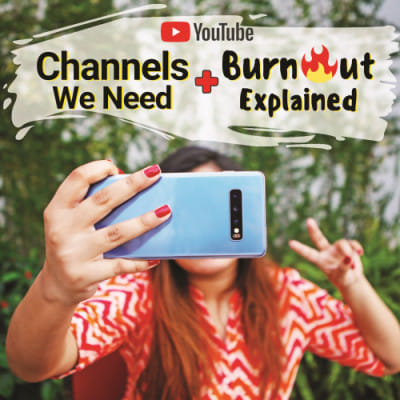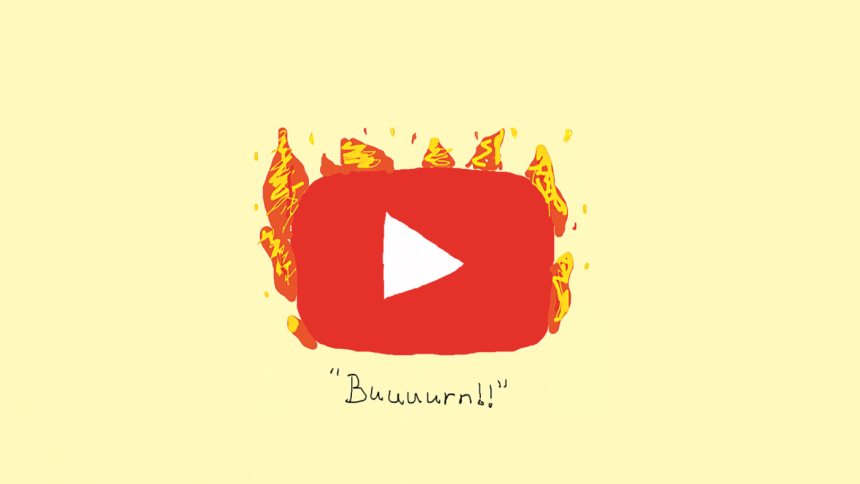YouTuber Burnout Explained

"I got burnt out. Once I had tasted the fame, I didn't like the limelight. I realised I wasn't built for that life."
– Rakin Absar, on why he did not become a mainstream celebrity
Since its inception fourteen years ago, YouTube has become a fundamental part of our lives. Not just for the youth but for people of all ages, it is an indispensable tool providing us access to video content from all over the world, be it instructional videos such as DIY tutorials or recipes, informational videos such as the latest news, especially with the LIVE option, free music, and all kinds of other entertainment. When you think about it, it really is an almost magical service that makes you want to say, "What a time to be alive!"
However, people for whom the magic of YouTube can be lost quickly are the creators who provide the users with all the content they love to gobble up.
Rakin Absar, previously popular for playing certain eccentric characters, introduces us to his initial struggles as a YouTuber, and how those struggles changed as he reached the peak of his fame on the platform.
"The initial struggle is not equipment or other logistics. The initial strife is to find your content and your own tune. A lot of people start out only trying to do what they think others will like," he expresses, saying that this cannot lead to a successful YouTube career, "if you consider YouTubing a career instead of doing it as your passion, then you are highly likely to burn out. The constant pressure of staying relevant to your audience will feel like a chore to you."
However, Absar mentions that given the fast-paced nature of the platform, getting one video to go viral isn't enough. The true test is remaining on people's recommendation sections, and this is what generates an enormous pressure on the creators. YouTubers aren't only putting up their content on the platform. They are usually putting up a version of themselves online alongside their videos. Seeing as this is a version they want people to connect with, their YouTube selves often tend to veer towards a more "always-on" personality, as was the case for Absar.
"You have to put up a face that's not you. I realised I didn't want to do that all the time. 'Rekina' was a very active character. It was fun playing that character, and I don't regret it, but I don't want to play that again ever," he conveys.
Constantly playing a hyperactive character can take a huge toll on a person. Additionally, with such a rich medium of communication, people want to know anything and everything about their favourite YouTubers. The nature of the platform allows the obsession that traditional celebrities encounter to be amplified to extraordinary levels. Audiences tend to attach affections to their favourite YouTubers, in a phenomenon known as forming parasocial relationships. However, much of the fan base will never actually meet their subscribed YouTuber in person, and so the "relationship" is heavily one-sided. YouTubers that attempt to hold up their audiences expectations in this regard end up investing immense amounts of their personal lives into their channels, leading to the generally inevitable burnout.

"Three years ago, I was very in-contact with my fans. I used to perform 'lives' regularly. I got burnt out bad. Now, I don't actively pursue that attention from social media anymore, or try to bridge that gap between my fans and I," expresses Absar.
Another reason behind their struggles lies in the nature of YouTube's algorithm. Salman Muqtadir, from SalmoN TheBrownFish, introduces us to the nature of the algorithm.
"Youtube's algorithm gets updated from time to time, and of course they don't let the content creators know exactly what they changed. However, the last algorithm change made it so that when your videos were longer they would get boosted."
Rahat Rahman, creator of YouTube channel ButtFiXx corroborates this saying, "When a channel creates videos frequently, YouTube considers that channel more active and thus understandably, sees potential for more ad revenues from the channel. Apparently, this leads YouTube to recommend videos from these 'active' channels more, providing more opportunities for these channels to grow." Combined, this knowledge simply means the more content you put out, and the more frequently you put it out, YouTube is likely to boost it accordingly, leading to further stress for creators.
"Even channels run by sizable groups tend to stagnate at times due to burnouts. To avoid this, a channel needs to reinvent themselves on a regular basis," states Rahman.
YouTube denies that this is the only way to get your videos into people's recommended sections, and while that may be true given the popularity of certain channels that only post short videos once every couple of months, it is undeniable that this is one of the well-known ways to reach greater audiences.
Keeping content creation aside, there are other struggles to being a popular YouTuber and maintaining one's subscribers. Continuously communicating with your fan base, facing the harshest criticism and always having to tactfully handle them, are all part of a YouTubers daily toil.
When it comes to criticism, Bangladeshi audiences are not known to hold back. Both Absar and Muqtadir agree that dealing with criticism is a skill one must master as a YouTuber. Both also agree that reading the comments is not a great idea, stating that they have stopped doing it completely.
"You have to focus on the positives. Many celebrities have fallen into depression because they entered the industry always expecting love and support, but when they came online they realised that they will also get negative comments and a lot of hate," relates Muqtadir.
When speaking about recovering from burnout, Rahman says, "Since I make content so infrequently, I haven't felt any burnout as of yet. But observing popular foreign channels, I would suggest anyone going through a burnout to pause and come up with something new. It might dip the views and channel activity for a while, but would benefit the channel in the long run."
Working with a group on YouTube can sometimes provide some relief, as Absar reveals. "When you're in groups, you can take their help. There are great opinions at work, and you have more resources. The pressure is divided and you can do bigger projects. However, individual projects are more fun because you don't have to worry about anyone else's opinions," states Absar.
Managing sponsorships is another aspect that adds more stress to an already overwhelming career. Muqtadir elaborates on this, saying, "Now that I am working for a network there is pressure to publish something every month which wasn't there before when I was with friends."
When asked whether he ever felt tired of being a YouTuber or was burnt out, Muqtadir responds, "Not exactly. However, it is becoming extremely difficult to make good content here. What I feel is that our perspectives are going backwards. I am not only talking about uneducated masses here. The tendency to get offended over the slightest circumstance holds true for a lot of educated people I have come across. Our mindsets are not progressing as I had expected when I had first started YouTubing in the country. If we keep continuing like this, we can never go ahead. Our surroundings are just becoming more toxic by the day."
Rabita Saleh is a perfectionist/workaholic. Email feedback to this generally boring person at [email protected]

 For all latest news, follow The Daily Star's Google News channel.
For all latest news, follow The Daily Star's Google News channel. 




Comments